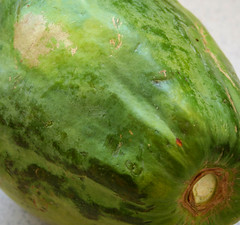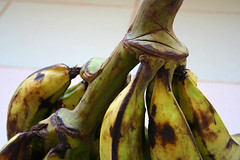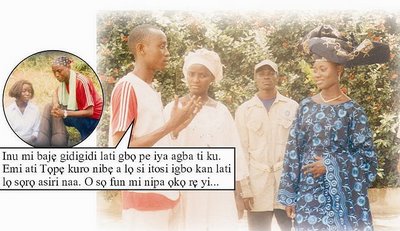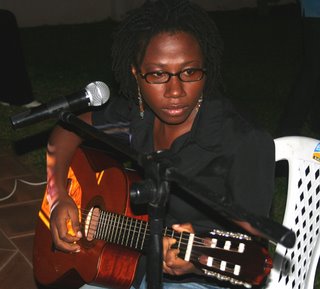Once in a while, we buy groceries from Zamani Farms in Jos. They deliver direct to your door in Abuja once a week. Best of all, they send weekly updates via email - emails from Norma at Zamani are a bit like the Archers rolled into Gardener's Question Time (Radio 4 programmes for green-fingers). I love reading their missives at least as much as I enjoy their delicious and lovingly farmed fruit and veg. Here is a snippet of this week's goings on at the farm (email [email protected] to join their mailing list):
"Hello Customers,
The weather continued very hot throughout last week. We are trying our best to water, but our dams are now dry, and we are having to make do with the several deep wells we have around the farm. It looks like the rain might be coming soon, but of course we don’t know when. We are hoping it holds off at least until the end of this week, as we are in the process of re-roofing our greenhouse, and if it rains our new crop of beef tomatoes are likely to spoil. But we are working as fast as we can to beat the rains. Once we finish, a bit of rain will be very welcome, both to replenish our water supply and also to cool down the temperature. However, the possibility of hail storms is always in our minds, and this is something we certainly don’t look forward to. Gentle rain is fine – too much, or rain with hail, can be disastrous for our delicate vegetables.
Meanwhile, the heat has had a negative effect on some of our items. Collard greens and kale have been adversely affected, as has our arugula crop. We have very little if any of these to supply next week. Broccoli also does not produce nice heads in the heat – they tend to go to flower, or have brown beads, which is a sign of heat burn. So don’t expect much by way of broccoli. Of course cauliflower is also off the list. It doesn’t grow in the hot weather, or in the rainy season, so none will be available until about November, in the next dry season.
Some of the items that we normally source from other local growers, like potatoes and cabbages, are becoming scarce and very expensive. We will continue supplying them as long as we can get good quality. We will let you know when they become unavailable or are priced well out of our range.
On the bright side, most of the items on our farm are still doing well.
We have plenty of courgettes, including some yellow ones and some cousa. Butternut and acorn squash are growing but are not yet ready.
Our new crop of aubergines, in several varieties, are growing well and are now flowering, So very soon we should have enough to meet all of your requests. They flourish in the hot weather.
Lettuces are still good, especially our butter cos (a cross between a cos and butterhead), regular cos both green and red, iceberg, some green and red butterhead, and our leaf lettuces like lollo rossa, prizeleaf, red fire, blackjack, and red and green salad bowl. There is also some Batavia, which is reddish and crunchy. There is some endive frisee, and a bit of radicchio as well.
All herbs are doing well, except for the arugula as I have already mentioned. Basils of all kinds are lovely, and other herbs also develop a very intense flavour as a result of the sun and hot weather.
Items like radishes, leeks, celery, spring onions, cucumbers and beetroot are nice. We have a small quantity of fennel, which doesn’t like the heat.
For greens, we have Swiss chard, spinach and sorrel. Green and red cabbages are available. However, we are between crops for Chinese cabbage and bok choi. The new batch will take another couple of weeks before they are ready to pick.
We have nice French beans, and should have a good supply until the rains really set in. Mangetout (snow peas) and sugar snap peas are on the way and will take another week or so. We will let you know when they are ready.
For the moment, we have only green bell peppers. The Italian corni di toro and coloured bell peppers are growing well (they enjoy the heat), and will be ready in a few weeks.
We have nice plum and cherry tomatoes, and a limited amount of beef. We had been supplementing the supply of beef tomatoes from a nearby farm, but we were not happy with the quality since they were a bit soft and tasteless, so in future we will supply only our own (which we think are much firmer and sweeter), even though we might not have enough for all your needs. As I noted above, we are fixing the roof on the greenhouse to protect the new crop of beef tomatoes which are growing very well and should start producing soon. Then we will have enough to go around.
Oyster mushrooms are available from The Mushroom Factory. No shiitakes for the time being, though.
We still have avocados, and have been supplying quite a lot. The trees ripen at different times, so we should have enough for the foreseeable future.
We also have got a good supply of nice garlic from Kano, and have been supplying that as well. They are better than the dried up heads you tend to find in the market. Our new shallots are growing, but we have none left to supply out of the last crop.
Strawberries continue to produce small fruit and in small quantities. They are very sweet, but tend to get soft quickly in the heat. They are good for desserts and sauces, but not for decorating pastries and such.
We have some cape gooseberries, and we are trying to keep the birds off so that we can harvest more...."
Read more...
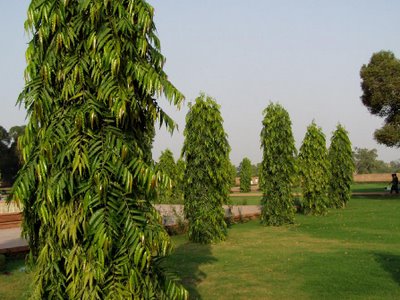 The Ashoka tree is found all over Abuja. There's a lovely long vista of them along Bill Clinton Drive on the way to the airport. They make the FCT landscape look almost Tuscan - the tropical equivalent of the cypress tree beloved of Renaissance landscapes. A friend of mine who grew up in Enugu calls them the masquerade tree - which is most apt. Its interesting to dig a little into the Indian provenance. As you can read here, the Buddha was born under an Ashoka in Lumbini in Northern India, and Lord Mahavira (the founder of Jainism) renounced the world under one. It is also a potent symbol within Hindu mythology.
The Ashoka tree is found all over Abuja. There's a lovely long vista of them along Bill Clinton Drive on the way to the airport. They make the FCT landscape look almost Tuscan - the tropical equivalent of the cypress tree beloved of Renaissance landscapes. A friend of mine who grew up in Enugu calls them the masquerade tree - which is most apt. Its interesting to dig a little into the Indian provenance. As you can read here, the Buddha was born under an Ashoka in Lumbini in Northern India, and Lord Mahavira (the founder of Jainism) renounced the world under one. It is also a potent symbol within Hindu mythology.

